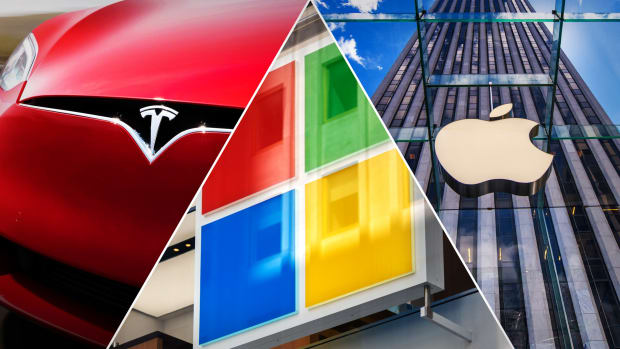
Investors sold more of their stocks than they purchased in November as they sought to lower their risk amid volatility in the market, according to data from TD Ameritrade.
“There has been a broad deleveraging across the Street," Alex Coffey, market strategist at TD Ameritrade, told TheStreet. "Our clients were reactive to the overall market."
The Investor Movement Index fell to 4.17 in November, down from 4.25 in October, which is the the behavior-based index created by TD Ameritrade that aggregates Main Street investor positions and activity. The index measures what investors bought and sold and how they were positioned in the markets.
Earnings season delivered mixed results and investors opted to make "more selective investments," he said.

Investors Bought These Stocks
Investors who traded stocks at TD Ameritrade bought shares of Tesla (TSLA), Taiwan Semiconductor Mfg. Co. Ltd. (TSM), Intel (INTC), Apple (AAPL) and Meta Platforms (META).
Tesla was an appealing stock because the declines during the period gave investors an opportunity "to get into a name that they missed the boat on," Coffey said.
While shares of Taiwan Semiconductor had been struggling, the stock surged by 31% last month. The semiconductor giant surged over 30% during the period, spurred by reports of its strong October sales growth
"Taiwan Semiconductor saw surge to the upside, which was an incredible move," he said.
The semiconductor company's shares rose as its earnings and revenue potential attracted investors who also applauded its plans to expand chip manufacturing into Arizona.
Intel, which is more of a household name to investors, still garners interest despite its struggles in valuation, Coffey said. The company spun off Mobileye, its autonomous car unit.
"The company has struggled and has not had the really strong outlooks to go with it," he said. "Intel tried to participate in the chip rally in October and November. It's a legacy blue chip name that still garners interest still with a 5% dividend yield."
One of the most consistently traded stocks is Apple even as it faced some setbacks in its share price largely due to disruptions around the production of the iPhone in China amid its lockdowns.
Despite the speculation and uncertainly about covid-19 restrictions in China, Apple's stock has been "quite impressive in 2022," Coffey said. "It has been down and is more resilient than its peers."
The 5% decline in Apple's stock provided an opportunity for investors who view it as a "safety net and a seemingly reliable stock," he said.
Meta Platforms instilled confidence in investors after the company announced it would reduce costs by cutting 13% of its workforce in November due to losing money in its investment into the metaverse.
"Investors were willing to bet money that most of their concerns were in the rear view mirror," Coffey said.
Investors took some money off the table when there was a bounce back in the S&P 500, he said.
Investors Sold These Five Stocks
Several companies reported mixed results for third quarter earnings and investors opted to sell shares in NVIDIA Corp. (NVDA), Netflix (NFLX), American Airlines Group (AAL), United Airlines (UAL) and Boeing (BA).
Investors chose to "take risk off the table" and sold shares of Nvidia and Netflix despite the semiconductor company's surge of over 17% and reported earnings during the November period, Coffey said.
"TD's clients reduced their exposure in Nvidia and saw a mixed picture with confirmation that the coast wasn't entirely clear," he said. "The company didn't paint a rosy picture. The risks still exist even though Nvidia had a good run for the past two months."
Investors are shifting their focus away from inflation being the primary fear as economic concerns are now yielding fears of a recession, he said.
"They are more reactive now, trying to be more nimble and are placing capital where it is best used," Coffey said. "They are looking for safety in names like Apple and consistency with names like Microsoft."
Millennial investors also reduced exposure during the November period, resulting in being net sellers of equities, mirroring the overall TD Ameritrade clients.
The Gen Y investors were also net buyers of two S&P sectors: consumer discretionary and financials," he said.
"Younger investors have a higher risk tolerance than the overall population, Coffey said.







